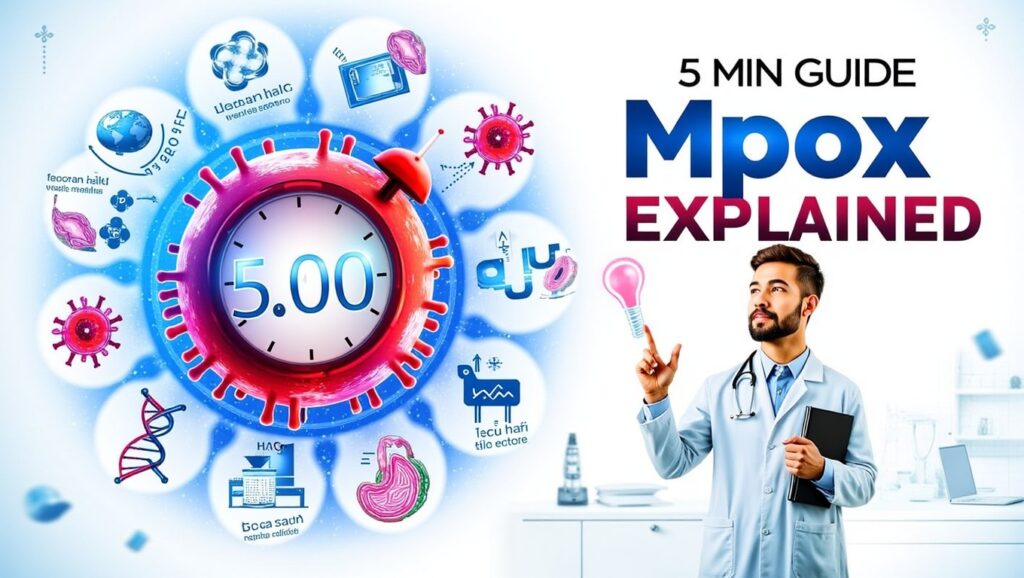Learn everything about Mpox in this concise guide. From causes to prevention, understand its significance, diagnosis, and global impact in just 5 minutes.

What is Mpox?
Mpox, formerly known as monkeypox, is a zoonotic viral disease that has recently gained global attention due to its increasing prevalence in humans. While it was initially discovered in 1958 in research monkeys, the primary reservoir of the virus lies in wild rodents. In recent years, human-to-human transmission has amplified, making Mpox a public health concern worldwide.
Why is Mpox Significant?
The global rise in Mpox cases highlights the need for awareness and proactive measures. This viral infection—closely related to smallpox—can lead to significant health complications, especially in immunocompromised individuals. Although smallpox vaccines offer partial protection, the growing spread of Mpox emphasizes the importance of updated research and prevention strategies.
Causes and Transmission
Mpox is caused by the Mpox virus, a member of the Orthopoxvirus genus. The virus spreads through:
- Direct contact with infected animals, particularly rodents or primates.
- Human-to-human transmission via respiratory droplets, bodily fluids, or contaminated objects.
- Close physical contact, including sexual activity, in some cases.
Understanding these pathways is critical to curbing the spread of the virus.
Symptoms and Diagnosis
Mpox symptoms typically manifest within 5 to 21 days after exposure and include:
- Fever, chills, and muscle aches.
- Swollen lymph nodes—a key distinguishing feature from smallpox.
- A characteristic rash that progresses from macules to pustules.
Diagnosis relies on clinical observation and laboratory confirmation through polymerase chain reaction (PCR) tests or viral cultures. Early detection is essential for effective management.
Treatment Options for Mpox
There is currently no specific antiviral treatment approved solely for Mpox. However, supportive care—such as fluid management, fever control, and secondary infection prevention—is crucial. Antivirals like Tecovirimat, initially developed for smallpox, have shown promise in treating severe Mpox cases. Vaccination with the smallpox vaccine, particularly for high-risk groups, remains an effective preventive measure.
Complications of Mpox
If left untreated, Mpox can lead to severe complications, such as:
- Secondary bacterial infections of the skin lesions.
- Respiratory distress in advanced cases.
- Rare but severe encephalitis.
- Eye infections leading to vision impairment.
Proactive medical attention can significantly reduce these risks.
Practical Prevention Tips
To minimize the risk of Mpox, consider the following practical steps:
- Avoid direct contact with wild animals, particularly in endemic regions.
- Practice good hygiene, including frequent handwashing.
- Use personal protective equipment (PPE) when caring for infected individuals.
- Stay informed about vaccination programs in your area.
Breakthrough Products for Immune Health
Supporting your immune system is a vital step in overall health. Nagano Tonic, a natural powder supplement, is rich in vitamin B6 and BCAAs, promoting metabolic support and muscle recovery. With its fat-burning and energy-boosting properties, Nagano Tonic helps you achieve a lean, healthy body. Learn more at Nagano Tonic.

Staying Informed About Mpox
Mpox represents a growing global challenge, underscoring the need for awareness and preparedness. As science advances, staying informed ensures you can make educated decisions about your health and contribute to public safety. The more we understand about Mpox, the better equipped we are to combat its spread and protect vulnerable populations.
Mpox is not just a medical issue but a societal one, requiring collective effort and vigilance. By staying updated on research and following recommended precautions, we can all play a part in mitigating its impact.
WHO’s Work on Mpox: A Global Perspective


Pingback: Mpox Outbreak: Travel-Linked Cases & Global Epidemiology Trends - stay healthy today